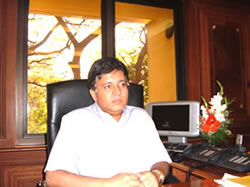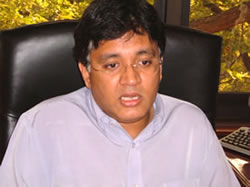Kalanithi Maran is getting ready for his next big project. The Sun Network chairman and managing director has applied for a license to operate a direct-to-home (DTH) service. Meanwhile, he is growing his cable business. He admits he is on the verge of acquiring Kolkata-based multi system operator RPG Netcom, which will give him a presence in the West Bengal market. He is also planning to launch in September a Bengali channel, Surjo.
Clearly, Maran is planning a footprint outside his southern bastion. In his own turf, he has virtually killed all competition. Zee Telefilms, he says, has tried to penetrate the south three times but failed. He knows Star and Sony also will eventually try to spread across the four regional states. He has, no doubt, made it difficult for them. But, as he says, they have also made it "difficult for me to penetrate into the Hindi language market."
Maran has not tasted failure so far. The challenge now for him is to concoct a successful recipe in the non-south market.
In conversation with Indiantelevision.com's Sibabrata Das and Bijoy A K at the Sun headquarters in Chennai, Maran spells out his aggressive plans for growing his media business into a pan national empire.
Excerpts.
|
Are you buying out RPG Netcom? |
||
|
Is it a strategy that outside South, wherever you launch a channel, you will pick up cable? |
||
|
How do you plan to turn around RPG Netcom when it doesn't have too many direct points? |
||
|
But what is your plan for RPG Netcom, particularly when you are saying that you are not going to use it to support your broadcasting business? |
||
|
But isn't Kolkata an unlikely market for value-added services? |
||
|
||
|
Are you in talks to acquire Manthan and Cablecom, the other two MSOs in Kolkata? |
||
|
Recently, you announced a reduction in the cost of Set-top boxes (STBs). What is your cable strategy? |
||
|
What are your plans for digital, particularly when it has not taken off in India so far? |
||
|
Has the experiment in Chennai been depressing? |
||
|
You said MSO is not a profitable form of business. So do you see distribution as a form of power where you can bully rival channels? |
||
|
What is your plan for DTH? |
||
|
There are rumours that Sun and Star will form an equity partnership? |
||
|
Why did you enter into a $25 million joint venture with Malaysia's Astro All Asia Network? |
||
|
Will you be launching other non South regional language channels through this joint venture? |
||
|
Are you also pacing up the launch of a Hindi channel? |
||
|
Do you think it is the right time for you to get into the northern market? |
||
|
Since you have such aggressive expansion plans, are you considering an initial public offering (IPO)? |
||
|
Are you looking at joint venture alliances to fund your growth? |
||
|
In 1999, you had expressed your intention to launch a Bengali channel. What took it so long? |
||
|
Surjo was planned for a 14 April launch. What has led to the delay? Is it because you are waiting for the RPG deal to get over before you launch the channel? |
||
|
Why then have you given Balaji Telefilms the sponsorship category programming on Surjo? |
||
|
In Bengal and the other regional language markets that you plan to enter, what will be your programming strategy? Will you be skewed towards movies? |
||
|
Late last year, you signed a multi-year agreement with Buena Vista International Television - Asia Pacific. This was Sun network's first ever deal with a Hollywood studio. Did the screening of dubbed movies work? |
||
|
Was it a wrong decision to acquire such a huge library? |
||
|
Sun Network has been in existence for 13 years. How has the audience taste changed over the period? |
||
|
How did Surya manage to get an edge over Asianet in the Kerala market? |
||
|
How have you managed to maintain the local flavour in the four southern states? |
||
|
What is the new genre of programming that you see emerging in the south? |
||
|
Is crime programming gaining ground? |
||
|
||
|
Movie costs have gone up abnormally high. Do the high acquisition costs justify the revenue? |
||
|
A group of Tamil films producers are planning to launch a channel. Will this threaten your movie monopoly? |
||
|
How strong is subscription revenue for Sun Network? |
||
|
Do you have a language-wise rather than a channel-specific approach to a pay model? |
||
|
Are we going to see further channel launches from your stable in the south market? |
||
|
Why is Sun not available on the DTH platform in the Middle East? |








